Question
Make a negotiation plan including the following question's answers: 1. What are the issues to be negotiated? 2. What are the priorities among the issues
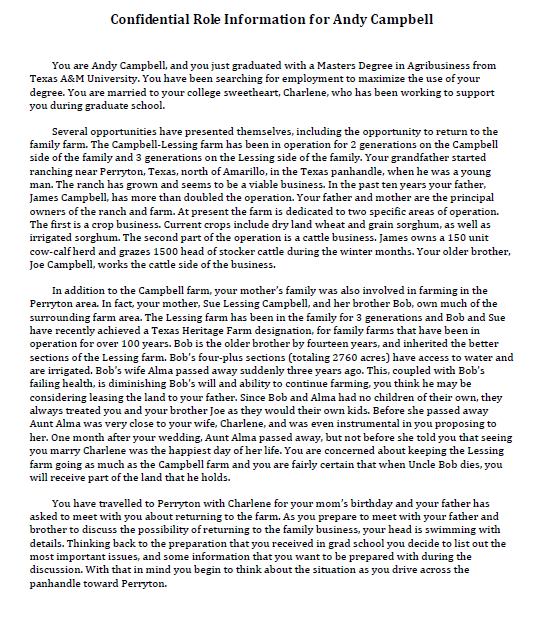
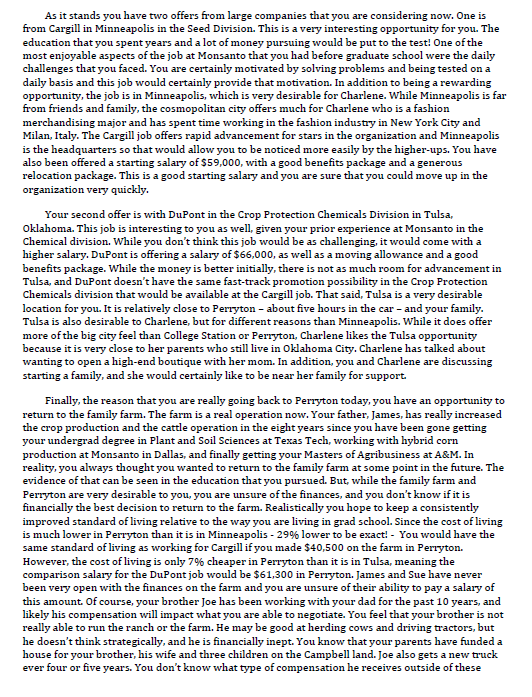
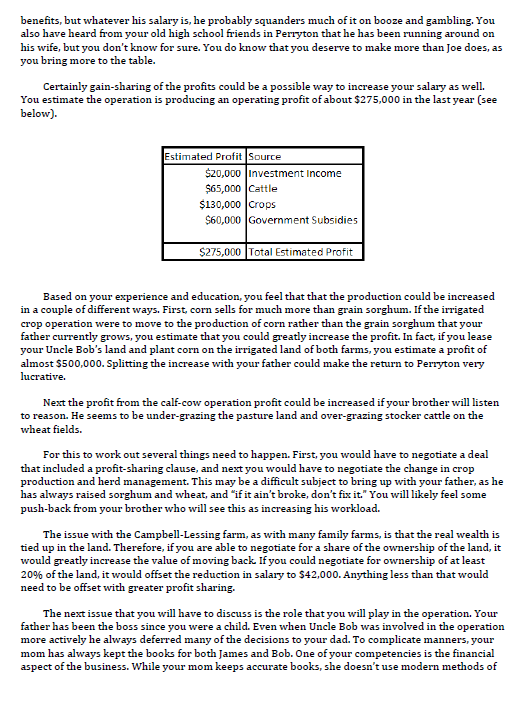
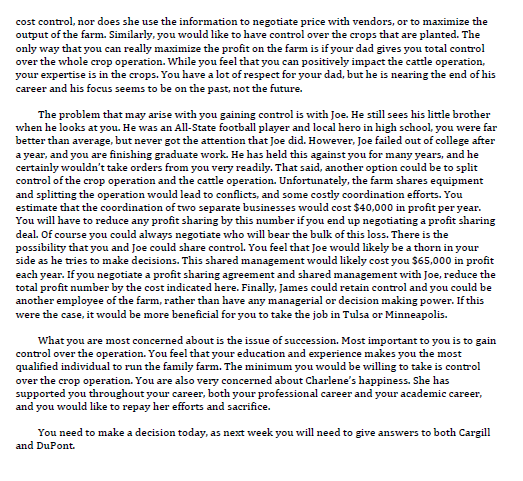
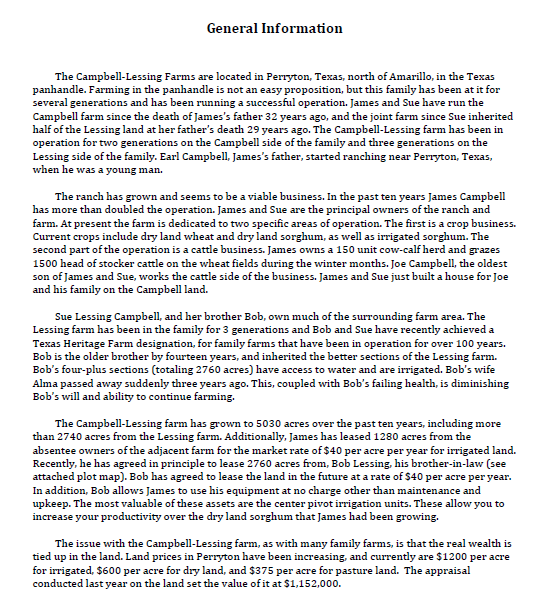
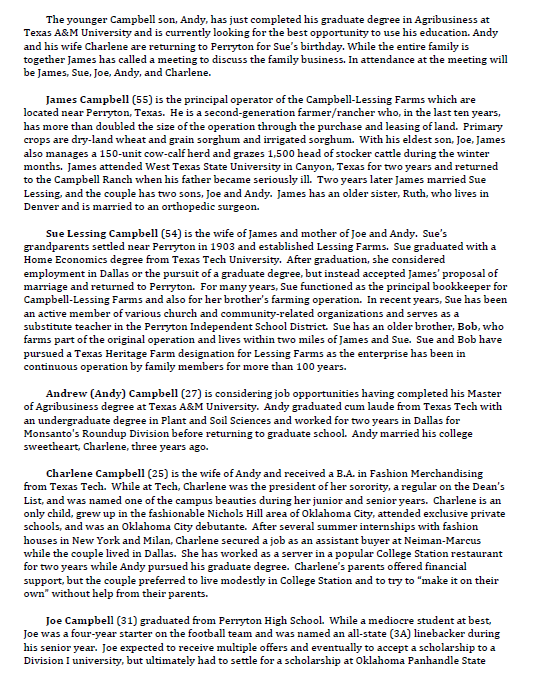

Make a negotiation plan including the following question's answers:
1. What are the issues to be negotiated?
2. What are the priorities among the issues in the bargaining mix?
3. What are the primary underlying interests?
4. What are my limits on each issue - walkaway points and BATNAs?
5. What are my target point and opening requests on these issues?
6. Who are the important constituencies to whom I am accountable?
7. What do I know about the other negotiator's interests, negotiating style, and personal reputation?
8. What overall strategy do I want to pursue?
Confidential Role Information for Andy Campbell You are Andy Campbell, and you just graduated with a Masters Degree in Agribusiness from Texas A\&M University. You have been searching for employment to maximize the use of your degree. You are married to your college sweetheart, Charlene, who has been working to support you during graduate school. Several opportunities have presented themselves, including the opportunity to return to the family farm. The Campbell-Lessing farm has been in operation for 2 generations on the Campbell side of the family and 3 generations on the Lessing side of the family. Your grandfather started ranching near Perryton, Texas, north of Amarillo, in the Texas panhandle, when he was a young man. The ranch has grown and seems to be a viable business. In the past ten years your father, James Campbell, has more than doubled the operation. Your father and mother are the principal owners of the ranch and farm. At present the farm is dedicated to two specific areas of operation. The first is a crop business. Current crops include dry land wheat and grain sorghum, as well as irrigated sorghum. The second part of the operation is a cattle business. James owns a 150 unit cow-calf herd and grazes 1500 head of stocker cattle during the winter months. Your older brother, Joe Campbell, works the cattle side of the business. In addition to the Campbell farm, your mother's family was also involved in farming in the Perryton area. In fact, your mother, Sue Lessing Campbell, and her brother Bob, own much of the surrounding farm area. The Lessing farm has been in the family for 3 generations and Bob and Sue have recently achieved a Texas Heritage Farm designation, for family farms that have been in operation for over 100 years. Bob is the older brother by fourteen years, and inherited the better sections of the Lessing farm. Bob's four-plus sections (totaling 2760 acres) have access to water and are irrigated. Bob's wife Alma passed away suddenly three years ago. This, coupled with Bob's failing health, is diminishing Bob's will and ability to continue farming, you think he may be considering leasing the land to your father. Since Bob and Alma had no children of their own, they always treated you and your brother Joe as they would their own kids. Before she passed away Aunt Alma was very close to your wife, Charlene, and was even instrumental in you proposing to her. One month after your wedding, Aunt Alma passed away, but not before she told you that seeing you marry Charlene was the happiest day of her life. You are concerned about keeping the Lessing farm going as much as the Campbell farm and you are fairly certain that when Uncle Bob dies, you will receive part of the land that he holds. You have travelled to Perryton with Charlene for your mom's birthday and your father has asked to meet with you about returning to the farm. As you prepare to meet with your father and brother to discuss the possibility of returning to the family business, your head is swimming with details. Thinking back to the preparation that you received in grad school you decide to list out the most important issues, and some information that you want to be prepared with during the discussion. With that in mind you begin to think about the situation as you drive across the panhandle toward Perryton. As it stands you have two offers from large companies that you are considering now. One is from Cargill in Minneapolis in the Seed Division. This is a very interesting opportunity for you. The education that you spent years and a lot of money pursuing would be put to the test! One of the most enjoyable aspects of the job at Monsanto that you had before graduate school were the daily challenges that you faced. You are certainly motivated by solving problems and being tested on a daily basis and this job would certainly provide that motivation. In addition to being a rewarding opportunity, the job is in Minneapolis, which is very desirable for Charlene. While Minneapolis is far from friends and family, the cosmopolitan city offers much for Charlene who is a fashion merchandising major and has spent time working in the fashion industry in New York City and Milan, Italy. The Cargill job offers rapid advancement for stars in the organization and Minneapolis is the headquarters so that would allow you to be noticed more easily by the higher-ups. You have also been offered a starting salary of $59,000, with a good benefits package and a generous relocation package. This is a good starting salary and you are sure that you could move up in the organization very quickly. Your second offer is with DuPont in the Crop Protection Chemicals Division in Tulsa, Oklahoma. This job is interesting to you as well, given your prior experience at Monsanto in the Chemical division. While you don't think this job would be as challenging, it would come with a higher salary. DuPont is offering a salary of $66,000, as well as a moving allowance and a good benefits package. While the money is better initially, there is not as much room for advancement in Tulsa, and DuPont doesn't have the same fast-track promotion possibility in the Crop Protection Chemicals division that would be available at the Cargill job. That said, Tulsa is a very desirable location for you. It is relatively close to Perryton - about five hours in the car - and your family. Tulsa is also desirable to Charlene, but for different reasons than Minneapolis. While it does offer more of the big city feel than College Station or Perryton, Charlene likes the Tulsa opportunity because it is very close to her parents who still live in Ollahoma City. Charlene has talked about wanting to open a high-end boutique with her mom. In addition, you and Charlene are discussing starting a family, and she would certainly like to be near her family for support. Finally, the reason that you are really going back to Perryton today, you have an opportunity to return to the family farm. The farm is a real operation now. Your father, James, has really increased the crop production and the cattle operation in the eight years since you have been gone getting your undergrad degree in Plant and Soil Sciences at Texas Tech, working with hybrid corn production at Monsanto in Dallas, and finally getting your Masters of Agribusiness at A\&M. In reality, you always thought you wanted to return to the family farm at some point in the future. The evidence of that can be seen in the education that you pursued. But, while the family farm and Perryton are very desirable to you, you are unsure of the finances, and you don't know if it is financially the best decision to return to the farm. Realistically you hope to keep a consistently improved standard of living relative to the way you are living in grad school. Since the cost of living is much lower in Perryton than it is in Minneapolis - 29% lower to be exact! - You would have the same standard of living as working for Cargill if you made $40,500 on the farm in Perryton. However, the cost of living is only 7% cheaper in Perryton than it is in Tulsa, meaning the comparison salary for the DuPont job would be $61,300 in Perryton. James and Sue have never been very open with the finances on the farm and you are unsure of their ability to pay a salary of this amount. Of course, your brother Joe has been working with your dad for the past 10 years, and likely his compensation will impact what you are able to negotiate. You feel that your brother is not really able to run the ranch or the farm. He may be good at herding cows and driving tractors, but he doesn't think strategically, and he is financially inept. You know that your parents have funded a house for your brother, his wife and three children on the Campbell land. Joe also gets a new truck ever four or five years. You don't know what type of compensation he receives outside of these benefits, but whatever his salary is, he probably squanders much of it on booze and gambling. You also have heard from your old high school friends in Perryton that he has been running around on his wife, but you don't know for sure. You do know that you deserve to make more than Joe does, as you bring more to the table. Certainly gain-sharing of the profits could be a possible way to increase your salary as well. You estimate the operation is producing an operating profit of about $275,000 in the last year (see below). Based on your experience and education, you feel that that the production could be increased in a couple of different ways. First, corn sells for much more than grain sorghum. If the irrigated crop operation were to move to the production of corn rather than the grain sorghum that your father currently grows, you estimate that you could greatly increase the profit. In fact, if you lease your Uncle Bob's land and plant corn on the irrigated land of both farms, you estimate a profit of almost $500,000. Splitting the increase with your father could make the return to Perryton very lucrative. Next the profit from the calf-cow operation profit could be increased if your brother will listen to reason. He seems to be under-grazing the pasture land and over-grazing stocker cattle on the wheat fields. For this to work out several things need to happen. First, you would have to negotiate a deal that included a profit-sharing clause, and next you would have to negotiate the change in crop production and herd management. This may be a difficult subject to bring up with your father, as he has always raised sorghum and wheat, and "if it ain't broke, don't fix it." You will likely feel some push-back from your brother who will see this as increasing his workload. The issue with the Campbell-Lessing farm, as with many family farms, is that the real wealth is tied up in the land. Therefore, if you are able to negotiate for a share of the ownership of the land, it would greatly increase the value of moving back. If you could negotiate for ownership of at least 20% of the land, it would offset the reduction in salary to $42,000. Anything less than that would need to be offset with greater profit sharing. The next issue that you will have to discuss is the role that you will play in the operation. Your father has been the boss since you were a child. Even when Uncle Bob was involved in the operation more actively he always deferred many of the decisions to your dad. To complicate manners, your mom has always kept the books for both James and Bob. One of your competencies is the financial aspect of the business. While your mom keeps accurate books, she doesn't use modern methods of cost control, nor does she use the information to negotiate price with vendors, or to maximize the output of the farm. Similarly, you would like to have control over the crops that are planted. The only way that you can really maximize the profit on the farm is if your dad gives you total control over the whole crop operation. While you feel that you can positively impact the cattle operation, your expertise is in the crops. You have a lot of respect for your dad, but he is nearing the end of his career and his focus seems to be on the past, not the future. The problem that may arise with you gaining control is with Joe. He still sees his little brother when he looks at you. He was an All-State football player and local hero in high school, you were far better than average, but never got the attention that Joe did. However, Joe failed out of college after a year, and you are finishing graduate work. He has held this against you for many years, and he certainly wouldn't take orders from you very readily. That said, another option could be to split control of the crop operation and the cattle operation. Unfortunately, the farm shares equipment and splitting the operation would lead to conflicts, and some costly coordination efforts. You estimate that the coordination of two separate businesses would cost $40,000 in profit per year. You will have to reduce any profit sharing by this number if you end up negotiating a profit sharing deal. Of course you could always negotiate who will bear the bulk of this loss. There is the possibility that you and Joe could share control. You feel that Joe would likely be a thorn in your side as he tries to make decisions. This shared management would likely cost you $65,000 in profit each year. If you negotiate a profit sharing agreement and shared management with Joe, reduce the total profit number by the cost indicated here. Finally, James could retain control and you could be another employee of the farm, rather than have any managerial or decision making power. If this were the case, it would be more beneficial for you to take the job in Tulsa or Minneapolis. What you are most concerned about is the issue of succession. Most important to you is to gain control over the operation. You feel that your education and experience makes you the most qualified individual to run the family farm. The minimum you would be willing to take is control over the crop operation. You are also very concerned about Charlene's happiness. She has supported you throughout your career, both your professional career and your academic career, and you would like to repay her efforts and sacrifice. You need to make a decision today, as next week you will need to give answers to both Cargill and DuPont. General Information The Campbell-Lessing Farms are located in Perryton, Texas, north of Amarillo, in the Texas panhandle. Farming in the panhandle is not an easy proposition, but this family has been at it for several generations and has been running a successful operation. James and Sue have run the Campbell farm since the death of James's father 32 years ago, and the joint farm since Sue inherited half of the Lessing land at her father's death 29 years ago. The Campbell-Lessing farm has been in operation for two generations on the Campbell side of the family and three generations on the Lessing side of the family. Earl Campbell, James's father, started ranching near Perryton, Texas, when he was a young man. The ranch has grown and seems to be a viable business. In the past ten years James Campbell has more than doubled the operation. James and Sue are the principal owners of the ranch and farm. At present the farm is dedicated to two specific areas of operation. The first is a crop business. Current crops include dry land wheat and dry land sorghum, as well as irrigated sorghum. The second part of the operation is a cattle business. James owns a 150 unit cow-calf herd and grazes 1500 head of stocker cattle on the wheat fields during the winter months. Joe Campbell, the oldest son of James and Sue, works the cattle side of the business. James and Sue just built a house for Joe and his family on the Campbell land. Sue Lessing Campbell, and her brother Bob, own much of the surrounding farm area. The Lessing farm has been in the family for 3 generations and Bob and Sue have recently achieved a Texas Heritage Farm designation, for family farms that have been in operation for over 100 years. Bob is the older brother by fourteen years, and inherited the better sections of the Lessing farm. Bob's four-plus sections (totaling 2760 acres) have access to water and are irrigated. Bob's wife Alma passed away suddenly three years ago. This, coupled with Bob's failing health, is diminishing Bob's will and ability to continue farming. The Campbell-Lessing farm has grown to 5030 acres over the past ten years, including more than 2740 acres from the Lessing farm. Additionally, James has leased 1280 acres from the absentee owners of the adjacent farm for the market rate of $40 per acre per year for irrigated land. Recently, he has agreed in principle to lease 2760 acres from, Bob Lessing, his brother-in-law (see attached plot map). Bob has agreed to lease the land in the future at a rate of $40 per acre per year. In addition, Bob allows James to use his equipment at no charge other than maintenance and upkeep. The most valuable of these assets are the center pivot irrigation units. These allow you to increase your productivity over the dry land sorghum that James had been growing. The issue with the Campbell-Lessing farm, as with many family farms, is that the real wealth is tied up in the land. Land prices in Perryton have been increasing, and currently are $1200 per acre for irrigated, $600 per acre for dry land, and $375 per acre for pasture land. The appraisal conducted last year on the land set the value of it at $1,152,000. The younger Campbell son, Andy, has just completed his graduate degree in Agribusiness at Texas A\&M University and is currently looking for the best opportunity to use his education. Andy and his wife Charlene are returning to Perryton for Sue's birthday. While the entire family is together James has called a meeting to discuss the family business. In attendance at the meeting will be James, Sue, Joe, Andy, and Charlene. James Campbell (55) is the principal operator of the Campbell-Lessing Farms which are located near Perryton, Texas. He is a second-generation farmer/rancher who, in the last ten years, has more than doubled the size of the operation through the purchase and leasing of land. Primary crops are dry-land wheat and grain sorghum and irrigated sorghum. With his eldest son, Joe, James also manages a 150-unit cow-calf herd and grazes 1,500 head of stocker cattle during the winter months. James attended West Texas State University in Canyon, Texas for two years and returned to the Campbell Ranch when his father became seriously ill. Two years later James married Sue Lessing, and the couple has two sons, Joe and Andy. James has an older sister, Ruth, who lives in Denver and is married to an orthopedic surgeon. Sue Lessing Campbell (54) is the wife of James and mother of Joe and Andy. Sue's grandparents settled near Perryton in 1903 and established Lessing Farms. Sue graduated with a Home Economics degree from Texas Tech University. After graduation, she considered employment in Dallas or the pursuit of a graduate degree, but instead accepted James' proposal of marriage and returned to Perryton. For many years, Sue functioned as the principal bookkeeper for Campbell-Lessing Farms and also for her brother's farming operation. In recent years, Sue has been an active member of various church and community-related organizations and serves as a substitute teacher in the Perryton Independent School District. Sue has an older brother, Bob, who farms part of the original operation and lives within two miles of James and Sue. Sue and Bob have pursued a Texas Heritage Farm designation for Lessing Farms as the enterprise has been in continuous operation by family members for more than 100 years. Andrew (Andy) Campbell (27) is considering job opportunities having completed his Master of Agribusiness degree at Texas A\&M University. Andy graduated cum laude from Texas Tech with an undergraduate degree in Plant and Soil Sciences and worked for two years in Dallas for Monsanto's Roundup Division before returning to graduate school. Andy married his college sweetheart, Charlene, three years ago. Charlene Campbell (25) is the wife of Andy and received a B.A. in Fashion Merchandising from Texas Tech. While at Tech, Charlene was the president of her sorority, a regular on the Dean's List, and was named one of the campus beauties during her junior and senior years. Charlene is an only child, grew up in the fashionable Nichols Hill area of Oklahoma City, attended exclusive private schools, and was an Oklahoma City debutante. After several summer internships with fashion houses in New York and Milan, Charlene secured a job as an assistant buyer at Neiman-Marcus while the couple lived in Dallas. She has worked as a server in a popular College Station restaurant for two years while Andy pursued his graduate degree. Charlene's parents offered financial support, but the couple preferred to live modestly in College Station and to try to "make it on their own" without help from their parents. Joe Campbell (31) graduated from Perryton High School. While a mediocre student at best, Joe was a four-year starter on the football team and was named an all-state (3A) linebacker during his senior year. Joe expected to receive multiple offers and eventually to accept a scholarship to a Division I university, but ultimately had to settle for a scholarship at Oklahoma Panhandle State University in Goodwell, Oklahoma. Unfortunately, Joe proved to be a "step slow" for linebacker and was too small to move to the defensive line. During his year in Oklahoma, he passed very few classes, but was known to have an active social life and to seldom miss a party or beer bust. Joe returned to Perryton in the fall of the next year and worked briefly at several jobs, rode bulls in the area rodeos, relived former glory days of football, chased girls, drank beer, and wrecked two pickups. In early January of the year after he dropped out of college he joined the farm operation at his parents' insistence and a few months later married a local woman, Sara. The couple has three children, sons (9) and (4) and a daughter (6) and until recently had lived in a modular home a quarter of a mile from his parent's "homeplaceStep by Step Solution
There are 3 Steps involved in it
Step: 1

Get Instant Access to Expert-Tailored Solutions
See step-by-step solutions with expert insights and AI powered tools for academic success
Step: 2

Step: 3

Ace Your Homework with AI
Get the answers you need in no time with our AI-driven, step-by-step assistance
Get Started


